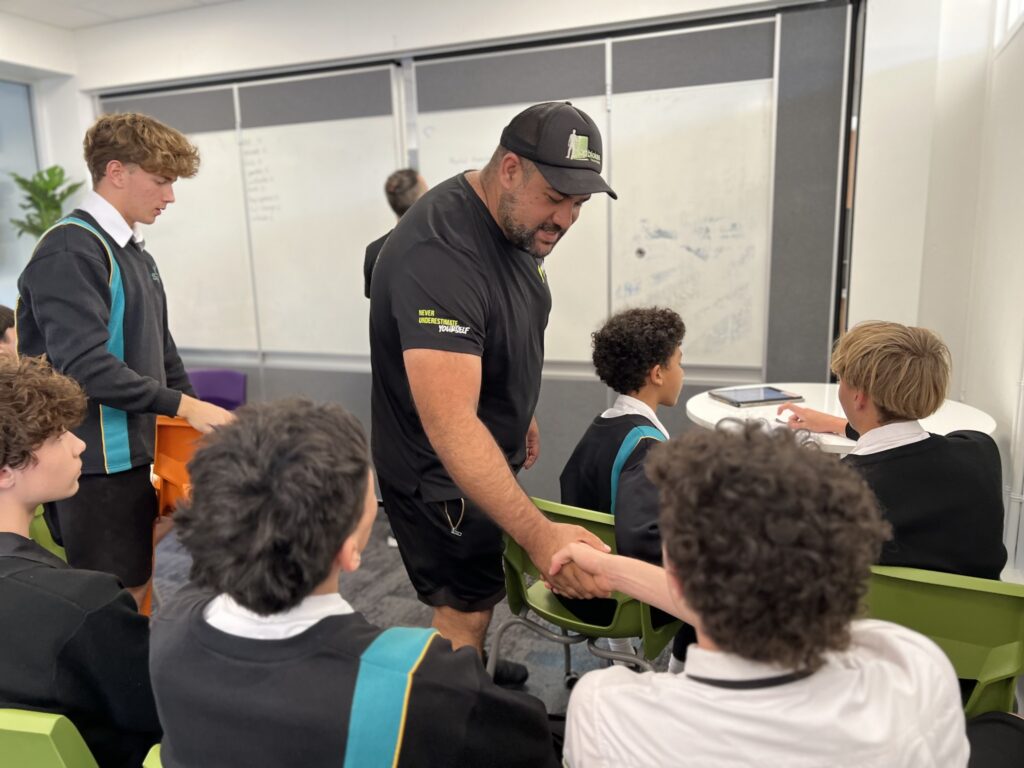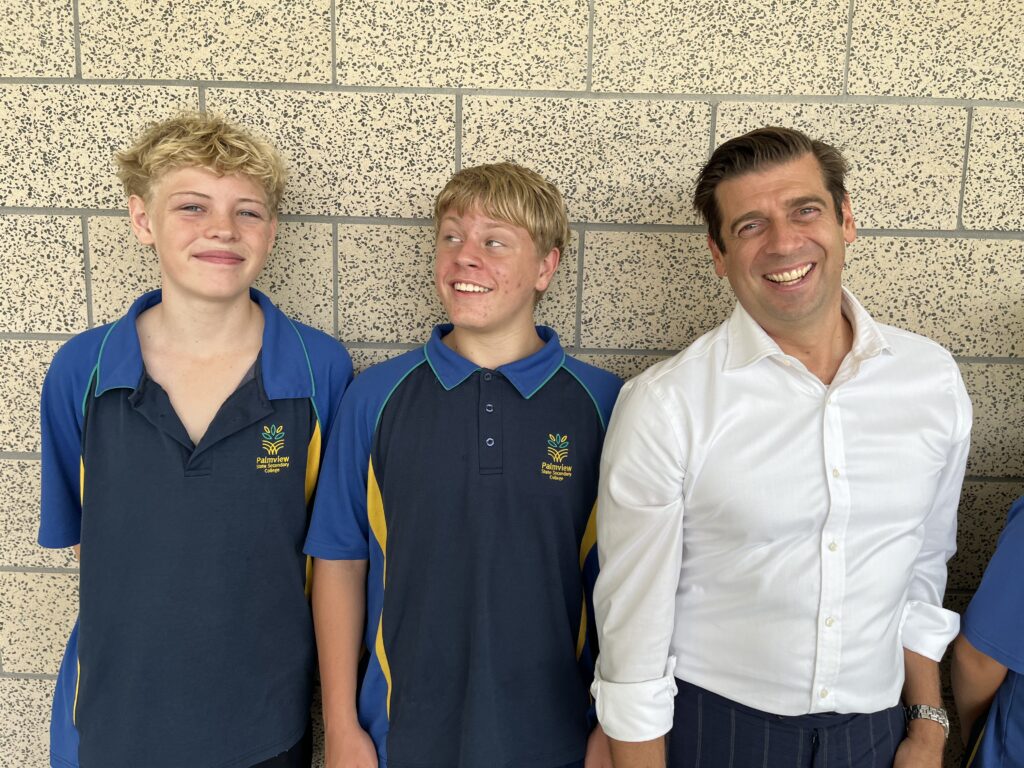Educators, parents, and carers often find themselves puzzled by teenage boys impulsive and seemingly reckless behaviour. We’re left scratching our heads while they’re pushing boundaries and taking risks. But when we dive deep inside the male teenage brain, we can see and understand the unique neurological development at play.
Renowned parenting expert and Top Blokes ambassador, Dr. Justin Coulson, sheds light on the evolving male brain, providing some fundamental knowledge and advice that can help us play a role in nurturing young males towards healthier and safer lives.
The neurological development discrepancy
The difference between male and female teenage brains is frequently commented on; they develop at different rates and at different times. In fact, this happens from day one of birth and continues well into the teenage years. “By the time kids are entering about grade seven, we think that there’s about a twelve to 18-month discrepancy in terms of neurological maturity between a male brain and a female brain. The girls are that much more in front,” says Dr. Coulson. This gap means that boys may exhibit behaviours that seem immature compared to their female peers, even though their intellectual capacities are the same.
What can we do? When we understand this discrepancy, it helps us be more patient and supportive. We’re not saying teenage boys are less capable; rather, their brains are simply developing at a different pace.
Impulsivity and sensation-seeking
A significant aspect of the teenage male brain is its heightened impulsivity and attraction to sensation-seeking behaviours. Dr. Coulson explains, “Teenage boys are significantly less likely than teenage girls to inhibit. Their impulsivity levels are much higher.” This tendency peaks around the age of 12 to 13 and coincides with a spike in testosterone levels. As a result, boys are more likely to engage in risky behaviours without fully considering the consequences.
“They see only upside, and that’s why they go at it. That’s why they jump off buildings. That’s why they drive fast in a car. That’s why they drink a large amount of alcohol really quickly. That’s why they’ll do dumb things,” Dr. Coulson notes. The promise of social status and cultural cachet, coupled with the increased activity in the brain’s reward centres, often outweighs any potential risks in their minds.
What can we do? To soften these behaviours, it’s essential to provide boys with safer outlets for their energy and desire for excitement. Encouraging participation in sports, creative projects, or other structured activities can help channel their impulsivity in positive directions.


The decline in empathy
Another critical factor in understanding the teenage male brain is understanding the decline in empathy during adolescence. “Empathy declines with boys as they enter adolescence, whereas for girls, there’s a steady increase,” says Dr. Coulson.
This decline affects both cognitive empathy (understanding how others feel) and affective empathy (feeling what others feel). With reduced empathy, boys may engage in behaviours that are hurtful to others without fully grasping the emotional impact of their actions. Dr. Coulson elaborates, “They will do and say hurtful things to one another, to their peers, and to strangers because of how it makes them look in the eyes of their peers.”
Programs like those offered by the Top Blokes Foundation play a crucial role in this area. By focusing on topics such as peer pressure, empathy, and emotional regulation, we help boys develop the critical skills needed to navigate their teenage years more successfully.
What can we do? Empathy training and emotional regulation should be the cornerstones of any program aimed at teenage boys in schools or community settings. Through consistent and engaging activities, we can help them develop emotional awareness and understanding, fostering more respectful and considerate behaviour. And for parents and carers? We’ve got you covered in our next point.
Teaching empathy and emotional regulation
Dr. Coulson acknowledges that teaching empathy to teenage boys is challenging but essential. “Empathy can be taught, but for teenage boys, it’s a really hard slog. It’s a slow process. Once it’s taught, it’s then up to the boy as to whether or not he’s going to listen to his conscience and follow it.”
“What this neurological research points to is the desperate need for us to teach it. Because otherwise, we’re waiting until boys have caught up at 27, 28, 29 years old before they finally realise what it is to be a good man,” Dr. Coulson emphasises.
Mirroring and modelling empathy and showing how we regulate our own emotions are all crucial in supporting teenage boys in their everyday lives.
What can we do? Let teenage boys see you listening actively, showing compassion, and responding to others’ feelings, including their own. Talk about your feelings and encourage teenage boys to express theirs too. Participating in community service, volunteering activities, and helping others can all help them see the positive impact of their actions on others.

Celebrating achievements meaningfully
When it comes to celebrating the accomplishments of teenage boys, Dr. Coulson suggests a more nuanced approach. “Making a big deal about them isn’t the best way to do it. In terms of celebrating their accomplishments and telling everybody how awesome they are, they see that as manipulative and coercive.”
Instead, building strong, respectful relationships and showing genuine appreciation for their efforts can be more impactful. “The best way that we can celebrate them is to get away from this idea that we have to have fireworks, balloons, and confetti every time a teenager does something great. Rather, we need to honour them and celebrate them by taking the time to be in their lives and caring about them,” notes Dr. Coulson.
What can we do? Be present. Put your phone away and spend quality time with them. Recognise and pinpoint what they did well that day rather than a general ‘you did great today’. Be explicit in your praise: ‘I loved the way you helped your friend by listening to him after training.’ But don’t be over the top; boys can sense if you are being disingenuous.
A first step to supporting young men
Understanding the unique development of the teenage male brain is a great first step in providing the support and guidance that young males need. By being patient, offering positive outlets for their energy, teaching empathy, and celebrating their achievements in meaningful ways, we can help them navigate their teenage years with resilience and empathy.
As Dr. Coulson reminds us, “Our job is to love our young people. We should help them feel that there is somebody in their life who has an irrational delight in them.”




